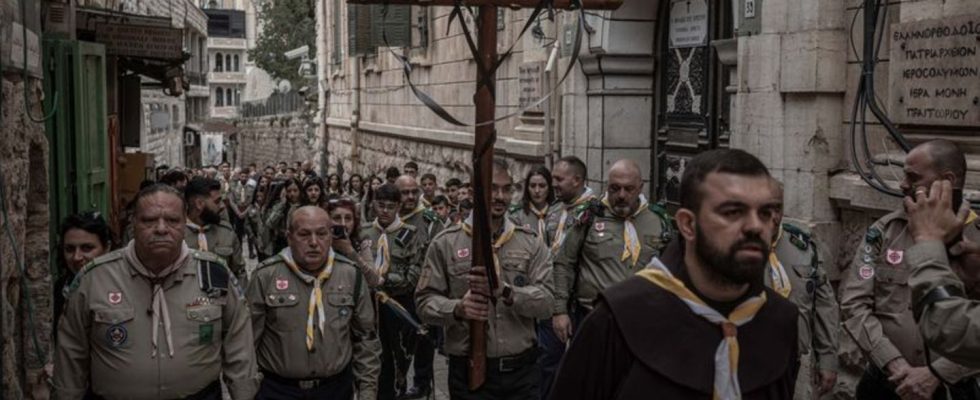religion
Easter in the shadow of war
Christian believers walk with a cross during a Good Friday procession. photo
© Ilia Yefimovich/dpa
Christians all over the world commemorate Jesus’ suffering on Good Friday. The suffering of the civilian population in Gaza and Ukraine has no foreseeable end.
The procession of people winds through narrow streets, past Israeli soldiers and police with automatic rifles. Singing and praying, several thousand Christians walk along the Via Dolorosa, the path of pain of Jesus Christ.
The traditional Good Friday procession in the old town of Jerusalem is different than in previous years. Far fewer believers than usual walk the path from the Church of the Scourging to the Church of the Holy Sepulchre, where, according to Christian tradition, Jesus was buried.
They are mainly Palestinian Christians. “It’s a sad year because of the tragic situation in Gaza,” says Daud Maliha (47), one of the pilgrims. “We remember the suffering of the people there and the suffering of Christ as we walk the path that led him to his place of crucifixion.” The nearly six-month war in the Gaza Strip has largely discouraged foreign pilgrims from traveling to Jerusalem.
It was triggered by the unprecedented attack on southern Israel by terrorists from Hamas and other extremist groups on October 7th. The invaders killed nearly 1,200 people and kidnapped another 250 as hostages in the Gaza Strip. Israel responded with massive air strikes and a ground offensive. According to the Hamas-controlled health authority, more than 32,000 Palestinians died in the war – although no distinction is made between fighters and civilians.
Among the participants in the procession, many young people and children can be seen wearing uniforms of Palestinian scout organizations. Most of the 5.3 million Palestinians are Muslims, while more than 200,000 Palestinians profess Christianity. The Good Friday procession is smaller this time because not only hardly any foreigners came, says Maliha, but also no Palestinian Christians from the Israeli-occupied West Bank. Since the outbreak of the Gaza war, Israel has allowed very few Palestinians from the West Bank to travel to Israel.
Empathizing with the ordeal
According to the Bible, Jesus suffered scourgings, whippings and humiliation on the way to his crucifixion. The procession participants will also walk along the Via Dolorosa on Good Friday this year to experience Jesus’ suffering firsthand. Some carry a wooden cross in memory of the fact that Jesus himself had to carry the cross to which he was nailed. This year, however, those pilgrims who put crowns of thorns on their heads are missing. This kind of deep and painful fervor is apparently more likely to be practiced by foreign pilgrims, who apparently did not arrive this year because of the Gaza war.
Easter is the most important festival for Christians all over the world. While they commemorate Jesus’ condemnation and crucifixion on Good Friday, they celebrate his resurrection on Easter Sunday. According to Christian belief, the crucified Jesus conquered death and thereby fulfilled his divine mission of salvation. According to this idea, with his martyrdom on earth he is said to have redeemed the Christian believers from their sins.
This year’s procession coincides with the third Friday of the fasting month of Ramadan, which is particularly holy to Muslims. Tens of thousands of Muslims flock to midday prayers at the Al-Aqsa Mosque on the Temple Mount plateau that overlooks Jerusalem’s Old City. Israeli security forces set up a large number of checkpoints to manage the various flows of pilgrims. In the run-up to Ramadan, Hamas called on its supporters to “march” on the Al-Aqsa Mosque – a blatant call for violent unrest. But so far, Ramadan in Jerusalem has passed without incident.
No Easter peace for Ukraine
Unlike in Jerusalem, in war-torn Ukraine there is little to indicate the approaching Easter on Western Good Friday. This is mainly because the vast majority of Ukrainians are Orthodox Christians, who, according to the Julian calendar, do not celebrate Easter until May 5th. However, Orthodox believers are currently in the 40-day period of Great Lent before Easter Sunday. Ukrainian restaurants traditionally offer an additional menu with dishes without meat, eggs and dairy products.
Only a little more than two percent of the more than 40 million Ukrainians – before the war – professed the Catholic or Protestant faith. On the other hand, over 70 percent feel they belong to the Orthodox churches or the Greek Catholic Church that follows the Orthodox rite. For them, Good Friday is only five weeks away, on May 3rd.
Before the Russian invasion in February 2022, there had been regular attempts to agree an Easter ceasefire between the separatists supported by Moscow and the Ukrainian government troops in the conflict in eastern Ukraine. As with the Easter festivals of the two previous years, no such ceasefire and therefore no at least short-term Easter peace is expected in Ukraine in 2024.

